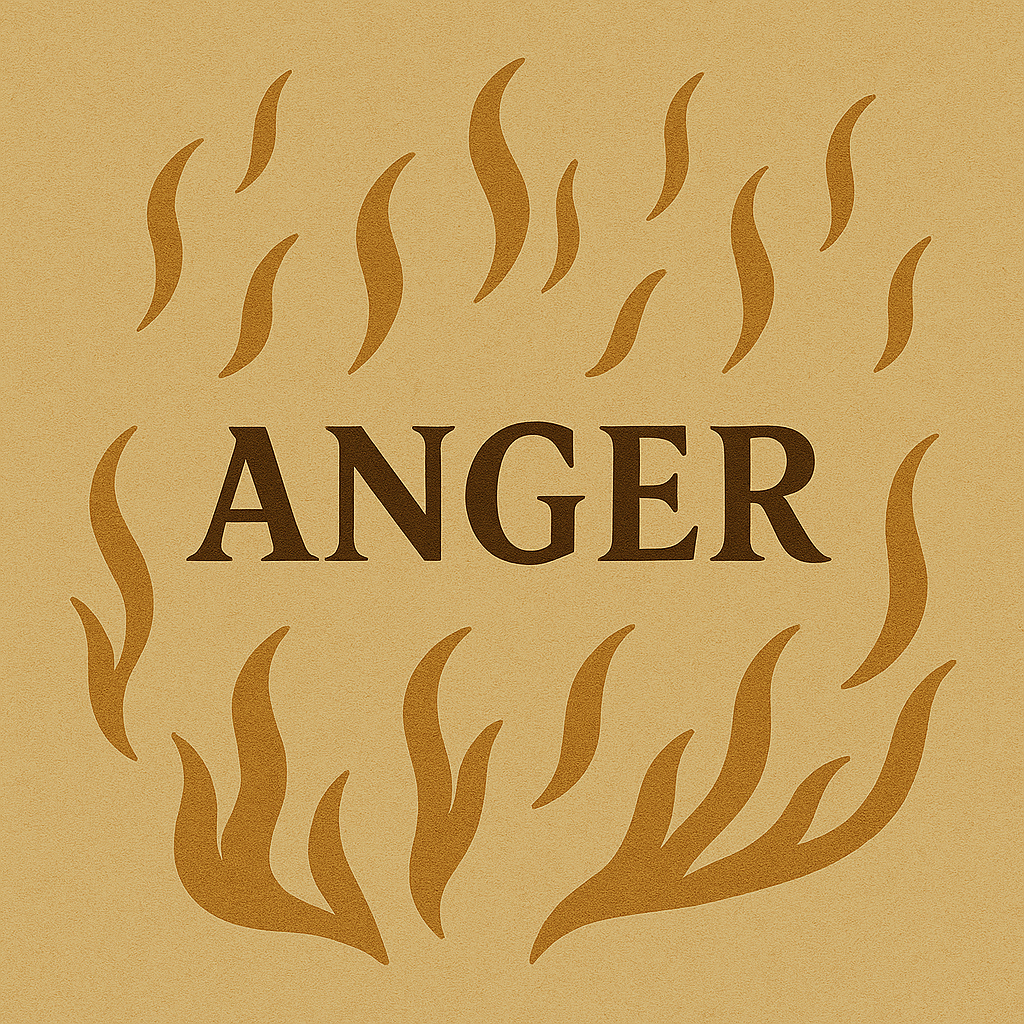Anger is not a bad emotion.
It is a raw one.
Like all emotions, it carries a truth, but not the whole truth. Left alone, it distorts. It flares up with urgency, claiming clarity, but it only reveals the truth that exists within its function:
Something is wrong.
Something hurts.
Something is unjust.
Anger is one of our most powerful emotions. And perhaps the most dangerous. Unlike sadness, which turns inward, or fear, which freezes, anger often explodes outward. It burns bridges, breaks trust, and says what we cannot unsay. Its energy is volcanic, and if mishandled, it leaves ruin in its wake.
I noticed this recently when I received bad news. Something deeply unfair had happened. Within seconds, anger surged. I did not reason my way into it; it simply took over. The Id, primal and reactive, felt wronged. It did not care for reason or evidence. It demanded to be heard.
That is the power of anger. And its danger. It resists logic. It overwhelms. Yet to reject it entirely is also a mistake.
Anger Is Not Evil, but It Is Incomplete
There is a common tendency, especially in spiritual or intellectual circles, to treat anger as something to be transcended. As if it were beneath us. As if the “evolved” response is always calm and measured.
But anger is not inherently wrong. It is not weakness. It is not failure. And it is certainly not something to be repressed.
Anger is a messenger. It is a signal, an alert that something in our world is misaligned.
It may be moral misalignment: injustice, betrayal, cruelty.
It may be personal misalignment: disrespect, boundary violation, frustration.
It may be inner misalignment: a conflict between who we are and how we are being treated.
Whatever the case, anger is feedback. It tells us, "This is not okay."
The problem is not that we get angry. The problem is when we confuse anger with truth, when we act from it rather than through it.
Acting Because of Anger, Not in It
The Stoics understood this tension. They were not emotionless, as they are often caricatured. They simply believed that emotions, or passions, should be processed through reason before being acted upon.
One of their key teachings was this: defer action. When gripped by passion, do not trust your impulse. Step back. Observe. Let the emotion rise and pass before you choose your response.
This is not suppression. It is discipline. It is giving space for the rational mind to regain control of the reins.
To borrow from Plato: the soul is a chariot, pulled by two horses. One is noble, honourable, spirited, and seeks justice. The other is wild, impulsive, and craves control. Anger can belong to either. When aligned with justice, it is a noble force. When driven by ego or wounded pride, it becomes the wild horse, powerful but dangerous without guidance.
The charioteer, reason, must guide them both.
Anger can be fuel, but it is not the map.
The Biology of the Flame
Anger does not just happen in the mind. It is a full-body response.
When we feel anger, the body prepares for conflict. Adrenaline spikes. Heart rate climbs. Blood flows to the limbs. Muscles tighten. Cortisol floods the system. We are wired for fight.
This was useful in the ancestral environment. If you were attacked or threatened, you needed to act immediately, decisively, and aggressively. There was no time to reflect.
But most modern conflicts are not saber-toothed tigers or rival tribes. They are emails, power plays, legal decisions, relational betrayals, and structural injustice.
If we act on our ancient wiring without reflection, we end up doing damage, to others and to ourselves. We fire off messages, burn through relationships, and escalate situations that require careful navigation.
We must learn to integrate the impulse without submitting to it.
Achilles
This dynamic is powerfully portrayed in Madeline Miller’s The Song of Achilles, a reimagining of the myth through the eyes of Patroclus, which I have recently read.
The novel gives flesh and feeling to Achilles’ rage not just as a hero’s flaw, but as a human reaction to grief, betrayal, and helplessness. His anger is not simple bravado; it is the pain of someone stripped of honour, of love, of control. When Patroclus is killed, Achilles is consumed by wrath, and his actions become cruel, almost inhuman.
Yet in the end, it is grief and memory not pride or revenge that redeem him. The novel reveals how love and loss can temper anger into something more human, more bearable.
It is a vivid illustration of what happens when anger is felt deeply, expressed destructively, and finally integrated through mourning and reflection.
Anger and the Work of Integration
This is where real maturity lies. Not in never feeling anger, but in developing a relationship with it. In integrating it into the self, rather than letting it control or consume us.
To integrate anger is to hear it clearly without obeying it blindly. It is to acknowledge the message, This is not okay, and then ask:
- What part of this is true?
- What part of this is my own projection?
- What action, if any, will lead to real resolution?
Anger is not meant to be buried. Buried anger does not die; it festers. It becomes resentment, passive aggression, self-hatred, and outbursts that seem to come from nowhere.
Nor should it be unleashed unfiltered. That only shifts the pain to someone else.
Instead, anger must be held, examined, translated, and turned into something constructive.
Sometimes that means confrontation.
Sometimes it means setting a boundary.
Sometimes it means walking away.
Sometimes it simply means grieving and letting go.
But in all cases, it means responding from your higher self, not the wounded, reactive part.
The Strength in Restraint
We can think of anger as strength. And in a way, it is. It gives us energy. It wakes us up. It fuels protest, resistance, and defiance.
But true strength is restraint. It is knowing you could destroy, and choosing not to. It is feeling the fire rise, and using it to illuminate, not incinerate.
As Marcus Aurelius wrote:
“How much more harmful are the consequences of anger than the causes of it.”
Meditations, Book 11, Section 18
That does not mean never acting. It means not letting anger be your only guide. Let it inform you, not rule you.
A Final Thought
Anger, like all emotions, belongs to us.
It is not shameful. It is not sinful. It is not a sign of failure.
But it must be approached with care. It must be questioned. It must be integrated.
Handled well, anger can sharpen our sense of justice. It can deepen our integrity. It can give us the courage to act when others stay silent.
Handled poorly, it burns everything in its path.
So the next time anger rises, try this:
Do not suppress it.
Do not submit to it.
Sit with it.
Let it speak. Let it burn away illusion. And then, with clear eyes and a steady hand, choose what to do with its truth.
This post contains affiliate links. If you buy something through them, I may earn a small commission at no extra cost to you.

